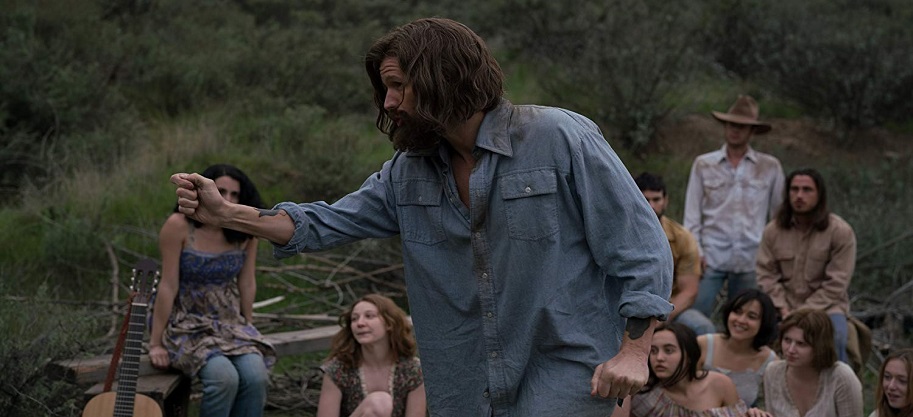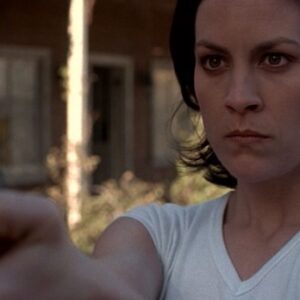Last Updated on July 30, 2021
PLOT: In August of 1969, Leslie Van Houten (Hannah Murray) falls prey to the baleful brainwash of master manipulator and murderous majordomo, Charles Manson.
REVIEW: There seems to be an unhealthy current trend in TV and movies to celebrate, romanticize and even attempt to justify some of the most atrocious of real-life serial killers in U.S. history. We’ve seen it in such recent exploitative tripe as THE HAUNTING OF SHARON TATE, the superb Mindhunters, the middling new Netflix joint EXTREMELY WICKED, SHOCKINGLY EVIL AND VILE, and can even expect more when Tarantino drops ONCE UPON A TIME IN HOLLYWOOD in a couple of months. The newest addition to this subset is CHARLIE SAYS, a variation on the theme which seeks to sympathize less with Manson and more with his harem of young impressionable female followers. Directed by Mary Harron from a script by Guinevere Turner, who decades ago struck critical gold with an AMERICAN PSYCHO of a fictional stripe, CHARLIE SAYS is sadly a fact-fudging, unmoving and misperceived mess that neither has the right protagonistic point of view, nor enough of a sympathetic sway to care all that much about what transpires. Aside from a stellar standout turn from Matt Smith as Manson and an honorable rehabilitative attempt from Karlene Faith, on whose memoir the screenplay is biasedly based, CHARLIE SAYS amounts to another feckless attempt to capitalize on an infamous American murder-spree as its 50th anniversary nears.

Hollywood Hills, August of 1969. A few hitchhikers catch a ride up the slope to Spawn Ranch, where Charles Manson’s nascent family camp resides. The hitchers include Leslie Van Houten (Murray), Patricia Kerwinkle (Sosie Bacon) and Tex Watson (Chace Crawford). Upon arrival, the two young women are immediately seduced by Manson’s subtle psychological sway. The self-proclaimed angelic figure and revolutionary leader begins spouting all kinds of hippy-dippy bullshit about the death of the ego and living free and happy off the land as one family unit. For Leslie and Patricia, who strip their identity to become Lulu and Katie as Charlie Says, Manson espouses unignorable gospel that they lap up without question. Worse, the girls are giddy and gleefully intoxicated by Manson’s persuasive aura, surely compounded by the acid tabs they swallow by the day. Much of the movie takes place at the Manson ranch, where the family subsists by dumpster-diving for food scraps and spend nights in orgiastic drug stupors. Matt Smith submerges himself in an unrecognizable role and does an admirable job of depicting both sides of Manson…Charlie the charmer, and Charlie the churlish charnel housekeeper whose hypocritical rants prove he’s less of a true leader then a petulant materialist after-all.
The narrative cleaves between the past and the present, where the two girls are interned in a woman’s correctional facility for the crimes. It’s here where the girls meet Karlene Faith (Merritt Wever), who worked tirelessly to understand why the girls followed Manson, and subsequently rehab their brainwashed psyches. She’s the real hero of the film and should be the protagonist, not Leslie. But of course, the biased partiality of lionizing the very person whose memoir served as the basis for the screenplay of the film is a bit false and self-serving as well. This leaves the film without a strong protagonistic perspective, and therefore nobody to really root for or side with in the end. The movie seems to posit that, due to Manson’s gravitational pull, the women in his hold had no sense of agency whatsoever. This despite the fact that the women happily accept such barbaric rules as women cannot hold money, cannot eat until the men have, must ask permission to sleep with men other than Manson, and cannot join the family unless they have something like a car to offer in return. Even when Manson espouses hypocritical hogwash, the women subjugate themselves to his wants and needs. Manson speaks about the death of ego, but then baldly claims that when music producer Terry Melcher hears him play, “he’ll lose his mind.” Manson has already lost his mind at this time, turning from an egomaniacal hypocrite to maniacal murderer.

Once Manson is musically rejected by Melcher, his violent tendencies and deadly directives increase, reinforcing his desire for fame and fortune. Little violence occurs in the film until the final half hour, which is sure to irk many horror heads and gore-hounds alike. Worse, using the Beatles Helter Skelter as inspiration, Manson seeks to incite a race-war by exacting murders to blame on black folks. Again, by this time the movie loses complete focus on who should be the heroic figure, Karlene Faith, and instead rushes to conclude with Leslie and Patricia seeing the err of their ways and voicing contrition. By then it’s too little too late, as there aren’t enough convincing therapeutic scenes with Karlene, nor enough to otherwise demonstrate the girls were truly sorry for their heinous actions. Because we’re given very little characteristic context regarding Leslie and Patricia before they met Charlie, it’s hard to really see them as anything other than their indoctrinated personas, and therefore hard to root for their return to self. And for a movie that plays so loose with the actual facts of the Manson family case, you’d think that a movie written and directed by women would give a little more power and agency to dictate the outcomes of their lives. In the moment, not after years of reflective imprisonment!
All this is to say, despite Smith giving perhaps the best rendition of Manson onscreen to date, CHARLIE SAYS hardly justifies its need to exist. It wants to explore the psychological interplay between Manson and his female acolytes that ultimately lead to the infamous violent outbursts, but the heroism is misplaced, the point of view unsure, and the women less sympathetic than they should be. Harron and Turner did a fictional AMERICAN PSYCHO justice, but can’t quite do the same for a nonfictional one.




















Follow the JOBLO MOVIE NETWORK
Follow us on YOUTUBE
Follow ARROW IN THE HEAD
Follow AITH on YOUTUBE